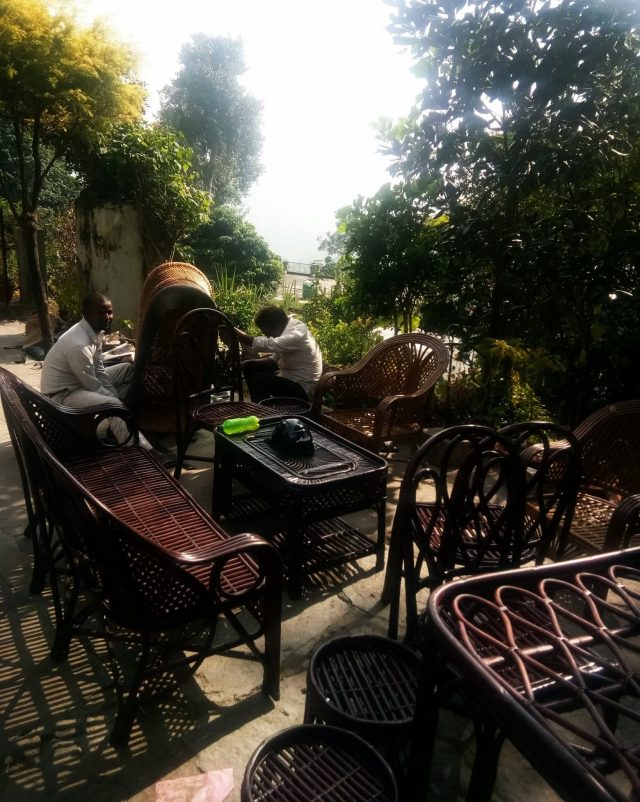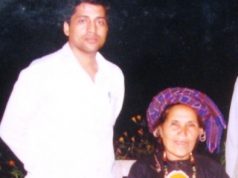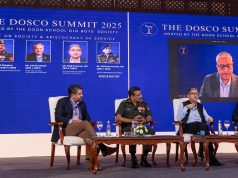The Tale of Raju & Arvind
 By Rajshekhar Pant
By Rajshekhar Pant
The relationship between itinerant vendors and the sparsely populated landscape of Uttarakhand’s mid-altitudes is tenuous. However out of place a vendor’s-cry may sound here at times, yet it is generally difficult to ignore. Especially when it is booming through a speaker in a curious concoction of Ameen Sayani’s silken flair and Johnny Lever’s dramatic flourish. It slices through your siesta, even when on a mellow October afternoon you’re slouched on an old cane chair left out in the courtyard for its annual Diwali paint, having taken a belly full of bari-bhaat & palak ka kapa (a staple Kumaoni lunch of the season).
One such afternoon, that voice pierced my drowsy calm. I peered down over the railing and spotted a man climbing the steep approach to our house. He was pushing a TVS XL 100, its modest engine no match for the gradient—or his own body weight. Strapped to the handlebars was a wooden speaker box, dripping a chaotic but catchy audio stream- a heady cocktail of religious hymns remixed to film tunes, peppered with hyperbolic announcements in that same Sayani-Lever voice:
“They’re here, they’re here!
Shukra and Shanichar are here!
On Shiva’s wedding fair,
They ate up tons of food!”
Cut….
Now the scene shifts—suddenly we’re in the middle of a dialogue between a middle-class couple planning a vacation. The zipper of the travel bag is broken. Disaster! But don’t worry, assures the same dramatic voice—Mohit bhaiyya is around, riding his TVS through the colony. From fixing zippers to polishing Red Chief shoes, he’s your man.
Cut again…
“Bholenath, all my friends tease me!
……………………..”
Now the voice is childlike, whimpering about parental negligence. Despite repeated reminders, the schoolbag’s zipper is still broken. How many times must he suggest visiting Mohit Uncle?
So that was his gig—fixing bags and shoes, zippers and soles. Once, in Bhimtal, my town, these were the domain of Dallu or Matru or the wizened Jhimman Dai, squatting beside a veranda, hammering away rubber stoppers for cracked soles, half-soles for worn sandals, leather loops to salvage torn flip-flops—Sundays were for such rituals. Now, those memories flicker only in nostalgia. But this man, struggling with his bike and belting bhajans, was clearly their reincarnation.
I waved him up. I needed rubber grommets fixed to my old cane furniture, and also the tyre linings on some footstools replaced. He smiled beatifically—eyes barely open, lips curved in a saintly grin. “Baba’s grace,” he said, and we made arrangements. He would return the next day, with a colleague.
He kept his words. And so began my acquaintance with Arvind Baba—and his companion Raju.
Arvind Baba, as he calls himself, is from a village near Budaun. He now squats in the backyard of a hotel in Haldwani. Besides shoe repairs, he weaves bamboo blinds and mats. Life in the hills is kind, he says. People are straightforward, respectful. The audio jingles on his bike? Set up in Bareilly. Cost him Rs 300.
“You need it for business these days,” he shrugs.
His son, Mohit, aged eight or nine, is the “Mohit Bhaiyya” from the soundtrack. Perhaps, linking his only ‘capital’—his skill, to his son’s name is his way of expressing love. He has three daughters too, all in good schools. But fees are steep—Rs 9,000 to Rs 10,000 “per course”. Still, Arvind doesn’t complain.
“No complaints, sir. God has made me just right for what I am.”
When I jokingly asked him later that what he’d ask for, if he ever met God face-to-face, he chuckled: “What would I ask for, sir? I know my place—We won’t starve. We won’t soar either.”
Hope doesn’t animate his mornings. Each day, he says, is just the return of yesterday’s stale sun.
His companion, Raju, is older, about forty-five, with a weathered face and sunken eyes. “My story’s already over,” he says impassively. His wife died after twenty days of illness. No treatment. Six children—two sons, four daughters. He’s married off two daughters. Now he’s trying to secure the Rs 51,000 government marriage grant through a local fixer. The village head has promised Rs 2.5 lakhs for a home—once “tea money” is arranged.
Arvind, meanwhile, praises the present government. “This is ‘our’ government, sir,” he says proudly.
He lights up when asked about the bhajans blaring from his bike.
“A devout Hindu Sir, not something else … I am a diehard devotee of Bhole baba.” There’s pride in his voice.
“As long as Baba (Shiva) blesses us, everything stays in place.”
In Arvind and Raju’s world, Shiva is more than a God – He’s a guarantee. His grace, they believe, allows them to live without fear or worry. For men fighting for survival without even knowing they’re at war, belief becomes anaesthetic. And in today’s India, Shiva is an elastic figure. A deity easily tied to ganja, charas, and euphemisms like “prasad”. The godhood of Shiva is repurposed to justify escapism as spirituality. And isn’t a significant section of our society now crafting a new definition of life around this? One where social taboos, moral binaries, and conventional understanding are irrelevant?
It terrifies me. But politically, it’s…convenient. Arvind finds dignity in declaring himself a Hindu, “not something else”. He believes Shiva will fix things. That ganja is not a drug but a blessing. No one tells him that the school is overcharging illegally. No one informs him of his rights under the RTE Act. No one tells him that government subsidies don’t require kickbacks. That his wife died in the absence of treatment within twenty days does not bother Raju, the friend of Arvind.
They do have views—views on life & death, on hunger, rising prices, on Article 370, Kashmir, Pakistan, Mandir-Masjid, Operation Sindoor and so on. And these views are often conditioned by religious faith, by destiny, karma, and God’s will. They view the chance sighting of a government agent or meeting a helpful tout as a stroke of divine luck. They’ve never heard of schemes for insurance or relief for workers in the unorganised sector. And even if they have, they’ve never been told how to access them. And so, they remain—devoted, distracted, and deeply useful. Yes, quite useful for politicians—seasoned and ruthless—herding people like Arvind and Raju is child’s play for them. Thinking men are dangerous, after all. The moment they start thinking, the entire theatre of collective nakedness might start to unravel.
India is the world’s largest democracy. And arguably, it appears to be most successful one also. Successful, because of people like Arvind and Raju, for whom the reigning and ruling class along with its working hands is godsent, handpicked by the destiny in accordance with the Karma.
No one is going to give you the credit of making the great democracy of this even greater country a legendary success Arvind and Raju! However, meeting you both has been a big pleasure and honour for me. But for you both, I could never have seen the true face, pace and grace of this great nation poised to become the Jagatguru.
Congratulations to you both for becoming a formidable bedrock for the unshakable foundation of the grand mausoleum of the alleged greatness of India, that is Bharat.
(The author is an amateur filmmaker, a photographer, and a writer, who has written
over a thousand write-ups, reports, etc., published in the leading newspapers and magazines of the country. He can be reached at pant.rajshekhar@gmail.com)







